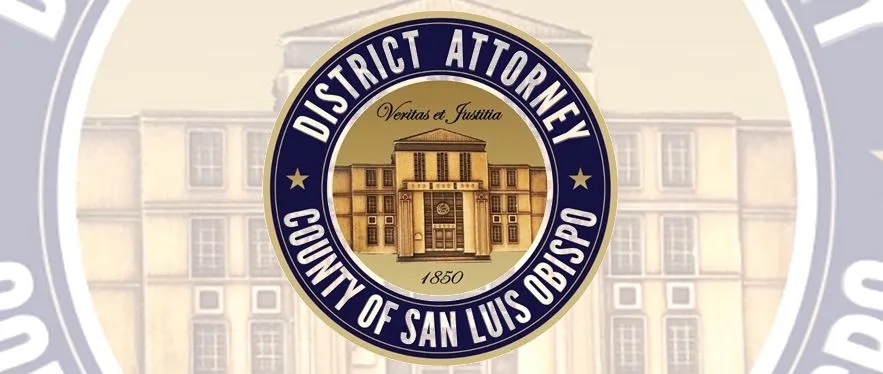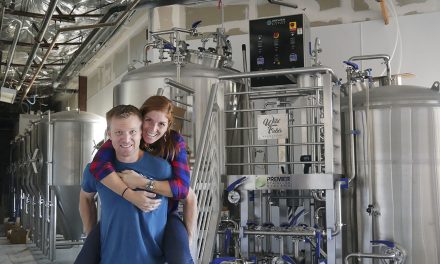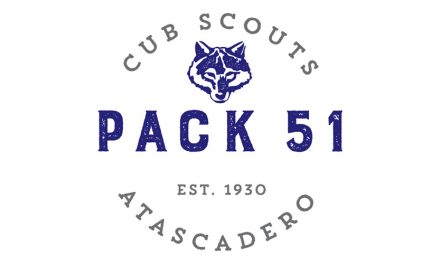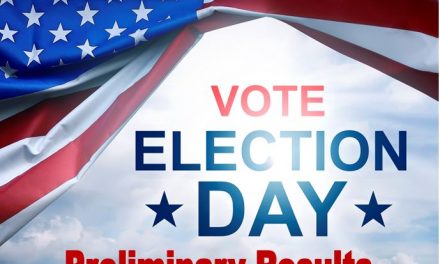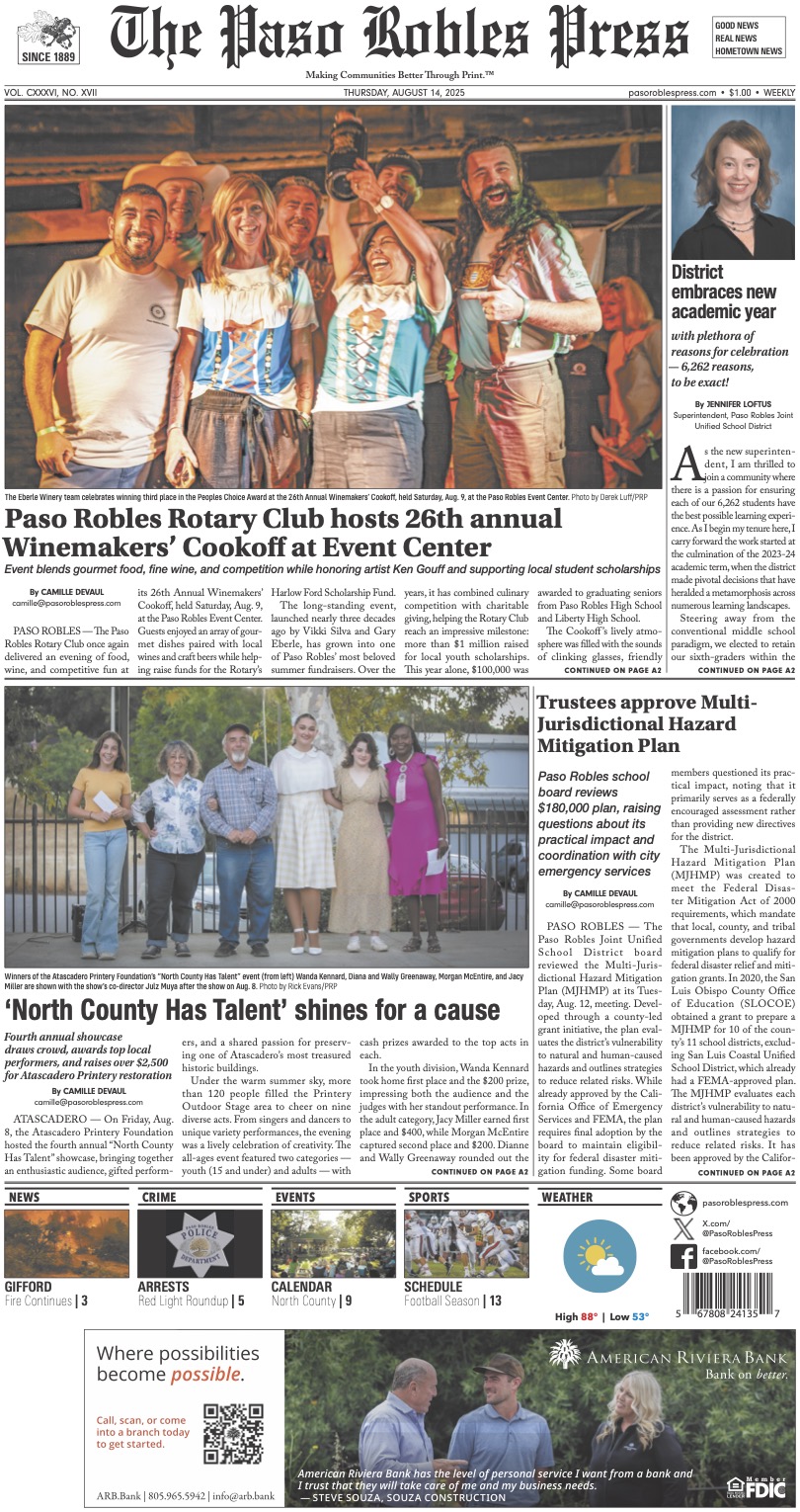Free clinic held for local residents whose convictions were processed through SLO County Superior Court
SAN LUIS OBISPO COUNTY — The San Luis Obispo County District Attorney’s Office, San Luis Obispo County Probation Department, San Luis Obispo Defenders, Restorative Partners, People’s Justice Project, California Rural Legal Assistance, and San Luis Obispo College of Law will host a free legal Clean Slate Clinic for criminal record expungement, felony reduction, and arrest record sealing on Friday, March 8, from 10 a.m. to 5 p.m. at the SLO County Law Library located at 1050 Monterey Street # 125, San Luis Obispo.
This free clinic is for local residents whose convictions were processed through San Luis Obispo County Superior Court.
The purpose of the Clean Slate Clinic is to help eliminate a barrier to employment and housing for individuals who have criminal records. A criminal record — no matter how old or how minor — can be a significant barrier to reentry for people when most employers, property managers and universities use background checks to screen applicants.
“Criminal records can make it very difficult for people to get jobs and housing after incarceration,” said San Luis Obispo County District Attorney Dan Dow. “We are proud to work with our community partners to help with the time-consuming and paperwork-intensive process of expunging criminal records and helping folks get on track to leading productive and engaged lives. The added stability that comes from obtaining employment and housing helps reduce rates of recidivism, which improves the overall quality of life in our community.”
“The vital expungement services we will help provide at our March 8 SLO Clean Slate Clinic will not only facilitate reentry for individuals with a criminal arrest or conviction but also improve access to equal justice for all,” added the Primary Public Defender for San Luis Obispo County Steve Rice.
“A criminal record can be a barrier to success and stability in life,” he said. “We believe that everyone deserves a second chance, and this clinic will give individuals the opportunity to start fresh.”
“Even a misdemeanor conviction or probation violation disqualifies a person from a wide range of benefits and opportunities,” said Joseph Doherty, managing attorney at CRLA’s Rural Reentry Project, president of People’s Justice Project, and professor of law at San Luis Obispo College of Law.
“Under federal law, any probation violation for any type of misdemeanor disqualifies an individual from welfare benefits, including Temporary Assistance to Needy Families (TANF), food stamps, low-income housing, and Supplemental Security Income for the elderly and disabled. The consequences of a drug misdemeanor conviction are particularly harsh and can include the loss of healthcare coverage, welfare, and student financial aid. Another benefit of this work that we have seen is that our clients who get their expungement petitions granted are not returning to the criminal justice system,” Doherty added.
Record clearance is crucial to ensuring that the collateral consequences that stem from a criminal record are eliminated or significantly reduced for the millions of individuals trying to rebuild their lives toward a successful future. Criminal record expungement confers numerous benefits for individuals convicted of certain misdemeanors and felonies. When applying for most jobs, individuals who successfully expunge their criminal record can lawfully answer “No” if asked whether they have been convicted of a crime. Moreover, an employer is not permitted to consider an expunged conviction that is discovered through a background check in making a hiring decision.
Expungement also benefits those seeking state professional licenses. To be sure, even after an expungement in many circumstances, an individual must disclose a conviction in response to a question posed in an application for a state license (e.g., a contractor license or real estate license) or in an application for public office. However, many licensing agencies are more likely to look favorably upon individuals who have successfully completed probation and whose convictions have been expunged. Further, under California law, “a person shall not be denied a license on the basis of any conviction, or on the basis of any acts underlying the conviction” if the conviction has been dismissed.
“Through our law school’s Clean Slate Clinics, community members feel heard and seen through the expungement process, a feeling that many have never felt before,” said Maren Christensen, associate dean of Clinical Education at San Luis Obispo College of Law. “An expungement grants our community members the ability to continue with their lives and positively contribute to our society.”
The California Policy Lab estimates nearly 1 in every 8 Californians with a criminal record is potentially eligible to obtain a full criminal record expungement; 81 percent of Californians with a criminal record are estimated to be eligible to have at least one prior arrest or conviction expunged.
If you are interested in clearing your criminal record, please make an appointment to receive services at the SLO Clean Slate Clinic on Friday, March 8, at (805) 902-CRLA (2752). Walk-ins are welcome, but appointments are strongly preferred.

